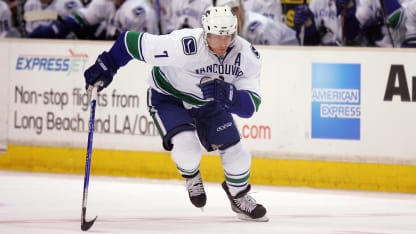The Canucks had a 4-0 lead, but the Flames battled back to tie things up. It was gut check time in game six heading into triple overtime and Morrison said going into each extra frame they chipped away at every shift and looked at it as an opportunity put the game away.
“You just never know how long these games are going to go on for, so you just have to be prepared to continue to do all the little things right and as the game goes on your shifts become shorter and you become a little bit more fatigued. Nobody wants to be that guy that makes a mistake, so you’re just thinking ‘Just be safe out there, just be safe and don’t take any chances,’ so that was kind of the mindset heading into overtime,” Morrison said.
The mental battle of playing through two hours of hockey is as difficult as the physical part of it, but Morrison reminded himself of the long hours he’d put in on the ice and in the gym during the offseason. The continued work from the summer through to the playoffs helped him perform in key moments on a big stage.
“I felt good. I felt like I was playing good hockey in that series and so I had decent confidence that I could be a difference maker. That’s the mindset you want to have. Going into those longer overtimes I kept reminding myself ‘Hey, you had a great summer, you put in all this work, you’re in good shape’ so just that positive reinforcement to really just keep your mind in a good place,” Morrison said.
“Eventually I got an opportunity, we won a puck battle in the corner, Näzzy bumped it to me and I was able to walk out and open my hips up and do what we call a 10-to-2 move and it worked out. I was able to outwait [Miikka] Kiprusoff, who was outstanding in that series, and I was able to slide it underneath him. It was a strange celebration, I collapsed to my knees, and I remembered being so tired. I guess more than anything it was relief right, knowing that we were in complete control of the game and then we almost gave it away. Winning that game, knowing we gave ourselves an opportunity to go back home and play that game seven was a good feeling.”
Being able to stop Calgary’s momentum meant not letting the moment get the best of them and staying even keel, continuing to do what they had always done.
The Pitt Meadows native had scored a couple of game-winning goals in regulation and overtime play in the regular season, and he says doing it in the playoffs takes another level of conjecture. Trevor Linden coined Morrison’s nickname “Mo-T” because of his knack for scoring overtime goals.
“You have to believe in yourself, and you have to have that confidence that you can be the guy. You want to be the guy, you don’t want to wait for something to happen, you want to try and make it happen. Sometimes the guys would call me Mo-T, so that was kind of funny. When you have that banter and you’ve had that feeling of doing it before I think you believe it can happen.”
B-Mo said that being able to find that extra gear was easy when you will do anything to help your teammates win.
“You see all the time and effort that these guys put in and all the work that goes into it, sacrifice, and time away from families, and all that stuff. So, if you can do just a small part or do anything to help the team get to their ultimate goal, that’s what it’s all about. It’s really just encouraging each other and being supportive.”
----------------------
Former Canucks’ goaltender Kirk McLean was part of the Canucks’ epic Stanley Cup Run in 1994.
During the 1994 playoff run, McLean backstopped the Canucks with a 15-9 record, posting a .928% save percentage stopping 761 shots through 24 games.
McLean prepared for games in the playoffs the same way he would for the regular season, which helped him through big games. He mentioned the team’s confidence grew after every round they advanced, and the coaching staff gave them confidence and kept things light.
“Right from Calgary when we’re going to game seven, Pat Quinn said, ‘Pack your bags, we’re going straight to Dallas,’ so there’s a boost of confidence from the coach and GM, that was the way he approached it. He and the rest of the coaching staff kept things pretty loose, whether it was telling a joke before the game or in between periods, just something like that," said McLean.
“The snowball started rolling and everybody’s confidence rose. We went into every game feeling like we had a chance. If anything, the only thing that’s going to beat us is ourselves if we don’t stick to our system or don’t believe in ourselves, but we’re definitely going to give ourselves a pretty good chance. Literally every game we didn’t care if we won it in 60 minutes or 90 minutes, whatever it takes.”
In the first round, McLean made a series-saving stop on Robert Reichel during the first overtime of game seven in the first round. There was certainty amongst the group going into overtime that they could pull out the win because they had already overcome a 3-1 series deficit against a Cup-favoured team.
“We were the underdogs going into it and we went through adversity going down three games to one. We took everything shift by shift, period by period, game by game,” McLean said.
McLean noted his teammate Greg Adams’ tying goal in game seven against the Flames as a clutch play that helped them continue their quest for the Cup.
"If he doesn’t score that goal there’s not even an overtime and there’s no ‘94 run,” McLean said.
McLean learned early on that in his position he needed to not get too high or too low and took pride in being a steady force that was reassuring to his teammates.
Adams felt it was Kirk’s demeanor that helped pull them through in key moments in games.
“With Kirk, it was his personality and his attitude. Even in tense situations, he was always very calm, he would be the guy joking around a bit, but he had a calmness about him that was also very helpful in the dressing room because when you see your goaltender relaxed and ready to play the game and not uptight, it made it easier for you to feel that way as well,” Adams said.
In the semi-finals against the Toronto Maple Leafs, McLean had back-to-back shutouts in games three and four. In game one against the Rangers in the Cup Finals he had a 52-save performance and 17 saves in overtime.
He found ways to stay consistent whether he was in the zone anticipating plays before they happened or breaking down the game into five or ten-minute segments to stay sharp, he said their leadership helped them keep looking forward at what they needed to do.
"We had some vocal leaders without a doubt, one being Trev, two being Tim Hunter, Babs would speak up once in a while. We weren’t an overly vocal group, but we had a lot of veteran players that when they did speak it came from the heart and it meant a lot. It was never in your face or anything like that, it was constructive criticism, or it was just pep talk type of thing. I just liked to focus in and visualize what was going to happen next period and tried not to worry about what just happened the previous period and went front there,” McLean said.
------------------
Greg Adams scored back-to-back overtime goals in the Canucks’ 1994 Stanley Cup run.
As McLean mentioned, Adams’ game-tying goal against Calgary in the first round was as important as his game-winning goals in the semifinals against the Leafs and in game one against the New York Rangers.
Against the Leafs, Adams scored the game five OT winner in the second overtime period to send the Canucks to the Stanley Cup Finals.



















